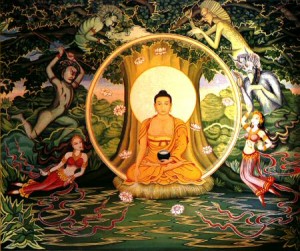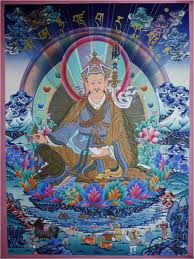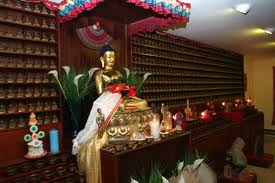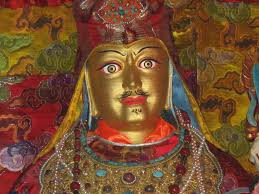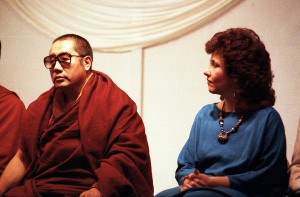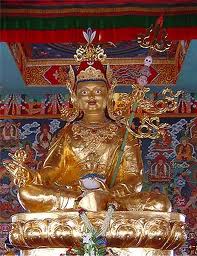The following is an excerpt from a teaching by Jetsunma Ahkon Lhamo called “Why We Suffer”
Sentient beings have an interesting preoccupation. And that preoccupation is with self; Is with perceiving its solidity; is with holding to it in a grasping and clinging way. And due to that preoccupation, we feel that we actually perceive all things in a dualistic fashion. That means that whatever is the content of our mindstream, we will actually see it flashed out there somewhere and it will take the form of our lives. And to the degree that we believe ourselves to be solid and real, and very, very kind of written in stone and unsurpassably solid, to that degree our environment feels exactly the same. Now, I’m not suggesting that you walk out in front of a taxi and say, ‘Hey you’re not really here. See if you can run over me.’ Because it will. Surely it will. You should practice a little more before you try something like that. Lots and lots of meditation. Like, maybe, lots and lots of meditation. I’ll give you the go when it’s time to stand in front of a taxi. You notice I never stand in front of taxies. But anyway, what we have to begin to do now is on a very subtle level. We have to understand that our experience is the revelation or display of our own mindstream. We have to begin with the very subtle characteristics. That’s as hard to do, believe it or not, as walking in front of a taxi is. Maybe harder. You walk in front of a taxi, boom, it’s over. You start to be a Buddhist and you look at your life and you realize that this is the content of your mindstream; and your suffering has just begun because our lives are tough. And this is very hard to realize.
You know, sentient beings, all of them, are fantastic creatures, everyone from human beings to cockroaches to non-physical beings, the ones that we can see and the ones that we can’t see. We are fantastic creatures. Our innate nature is the Buddha nature. In our essence we are the enlightened mind, the basis of all our experience. Everything that we have ever experienced is the great primordial emptiness. We are fantastic creatures. That is our nature. In our teaching it says over and over again, in our nature we are the all-pervasive, foundational bodhicitta, the all-pervasive compassion. We are the very Lord in our nature. That’s what it says in all the teachings.
But we are so deeply caught up in the habit of self-absorption, so deeply and compulsively caught up in the belief and solidity of self that the great lamas, the great Buddhas, the great boddhisattvas, they can all come to the earth and say, ‘This is what you are; this is what it is; and this is what you should do.’ And it seems that we have so little capacity to take this nectar and really utilize it, really turn around the content of our experience.
How many times have lamas said to us, ‘This is the great truth. This is the great meditation. This is the nature. This is our nature. And this is the method by which we can accomplish the awakening through that nature.’ And how little has been our regard for that nourishment. It’s as though nectar were being poured down from the skies and we have tiny, tiny, tiny little mouths unable to open and great big stomachs full of hunger pang. We can’t seem to pick it up. But occasionally, very rarely, as rare as finding a precious jewel by sifting through garbage, occasionally some virtue that we have accumulated in the past—who knows what it was—from feeding a child to accidentally walking around a stupa because you didn’t know what direction you were walking in; some virtue that might have to do with helping someone and might have to do with accidentally doing something that is of benefit to someone in some way that you never could have imagined,… Somehow these unpredictable and wonderful events have lined up in such a rare way as to create one moment, one tiny window. And believe me, in the amount of time that we have been sentient beings, this whole lifetime is a very tiny window. Somehow things have lined up into this tiny window that we call a precious human rebirth. And even within this precious human rebirth, somehow miraculously there is this incredible lineup.Who could have predicted it? Who could have known how it could happen? There’s no way that you can force this to happen. It just happens because cause and effect relationships are like the wind and you never know which way they’re going to blow. And suddenly they blow in the right direction and here’s this window and you can hear the Buddha’s teaching. And somehow magically in the space of that, you are moved enough to hear it well enough to step out of the compulsive, habitual tendency that has your mind as tight as a rubberband and come up with the brilliant idea: I can change. I can turn this around. I can plant a new seed. I can accept that these are my habitual tendencies, and I can begin to work to apply the antidote.
You cannot imagine how rare such a thing is. Even if it’s possible for all of us to come here and hear teachings every day for the next three hundred years and within those next three hundred years that you would have one such moment, one moment like that, when you say, ‘Yes, enough. Let’s change. Let’s do it now. Let’s apply the teaching.’ And then you really apply the teaching. For those circumstances to line up like that is so rare. It should be considered like the preciousness of a jewel and as rare as though you had found it by sifting through garbage. Strangely, it’s your own garbage and it’s also your own jewel. It’s the finding that’s the hard part.
But Here’s what you should do. If you have the opportunity to have been born in a precious human rebirth, and you have, then you should play on that immediately by lining up your intention and beginning to make wishing prayers that you will be able to make use of this time. Make them all the time, constantly. Never stop making wishing prayers. Couple those wishing prayers by accumulating the merit and beginning the process of actually being of benefit to others by making wishing prayers that others will also find the precious human rebirth and that they too will find the auspicious circumstances. Begin to work on that a little bit. Line it up. Take hold of it. Don’t let it slide by you. You’re not a Barbie doll like those little kids were holding. You don’t have to sit in class like this, or like this. Barbie doll is like this. You don’t have to do that. And you don’t have to do that in your mind either. Begin to line up the circumstances. Begin to play on it. Begin to make it happen for you. Come to the teachings. Then when you hear the teachings, listen to the teachings. Listen to them well. Line your mind up. Take a hold of yourself. Take a hold yourself. You do have that power.
If you think that the blessing of enlightenment is going to come from outside; if you think that you have no control; if you think that you are good because your parents made you good, or you’re bad because your parents made you bad; if you think like that, forget it. You’re not going to do anything. You’re going to wait. You know what waiting produces? Waiting. That’s what waiting produces. It produces waiting. It’s like a little baby. Was drooling before, drooling after. If you continue to wait, you continue to drool. There’s logic in there somewhere. I know you can’t think about that right now, but truly, waiting is not going to help. But to take a hold of yourself and not let the experience of this precious and auspicious opportunity simply slide by you; to open your mind; to make your mind like a bowl; to practice as though nectar were being poured into you, and to really practice; to line it up and to do it. Honestly and truly. You have that opportunity, but only you can line it up and make it happen. Only you can do that.
© Jetsunma Ahkön Lhamo all rights reserved


